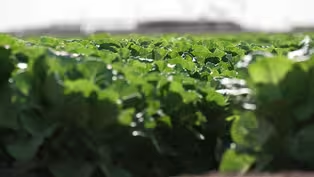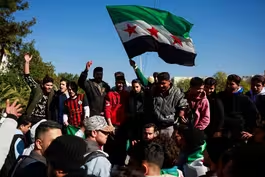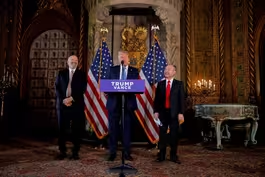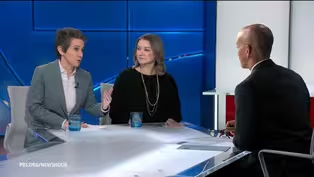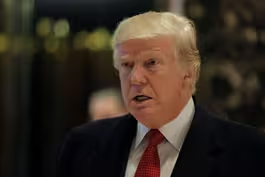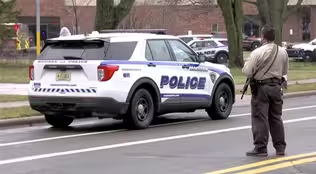
Syrian leaders face decisions as they chart path for country
Clip: 12/16/2024 | 4m 54sVideo has Closed Captions
Syria's rebel leaders face critical decisions as they chart new path for the country
For the first time since he fled the country he ruled with an iron fist and a willingness to kill his own people to hold power, Bashar al-Assad was heard from. In a statement from exile in Moscow, Assad claimed he did not want to leave Syria but was evacuated by Russia after he left Damascus for his family's heartland near the coast. Special correspondent Leila Molana-Allen reports from Latakia.
Problems playing video? | Closed Captioning Feedback
Problems playing video? | Closed Captioning Feedback
Major corporate funding for the PBS News Hour is provided by BDO, BNSF, Consumer Cellular, American Cruise Lines, and Raymond James. Funding for the PBS NewsHour Weekend is provided by...

Syrian leaders face decisions as they chart path for country
Clip: 12/16/2024 | 4m 54sVideo has Closed Captions
For the first time since he fled the country he ruled with an iron fist and a willingness to kill his own people to hold power, Bashar al-Assad was heard from. In a statement from exile in Moscow, Assad claimed he did not want to leave Syria but was evacuated by Russia after he left Damascus for his family's heartland near the coast. Special correspondent Leila Molana-Allen reports from Latakia.
Problems playing video? | Closed Captioning Feedback
How to Watch PBS News Hour
PBS News Hour is available to stream on pbs.org and the free PBS App, available on iPhone, Apple TV, Android TV, Android smartphones, Amazon Fire TV, Amazon Fire Tablet, Roku, Samsung Smart TV, and Vizio.
Providing Support for PBS.org
Learn Moreabout PBS online sponsorshipAMNA NAWAZ: Now, from the far south of Syria to Aleppo in the north, where we find our special correspondent, Leila Molana-Allen, tonight.
She and her team also spent time in Latakia on the coast earlier today.
So, Leila, as we heard from ousted President Bashar al-Assad for the first time today, tell us more about what exactly he had to say.
LEILA MOLANA-ALLEN: So, indeed, this was the first time that anyone in Syria has heard from him since, as everyone thought, he fled on the 7th of December, when it became clear that rebels were about to take Damascus.
Everyone thought that he got on a plane to Moscow with his family, but he has released a statement today claiming that actually he went north to Latakia, that's the Alawite heartland, the sect that the Assad family is from, and went to a Russian base called Hmeimim with his allies there, hoping to regroup and firm up those lines with the Syrian armed forces.
But he says, when it became clear that all the armed forces had laid down their weapons and the rebels were taking the entire area, the Russians evacuated him out on the Sunday.
Now, he says that he never had any intention to flee his country, that he's always supported his country and never sold it out, and that he only went to Russia because it became clear that nothing more could be done in terrorism, as he calls it, these rebels had taken over the whole country.
Now, he closes by saying that he doesn't, it seems, plan to come back because, once terrorism has taken over a country, there is no place for leaders there, but that he hopes that one day Syria will be free and independent again from these rebels.
Of course, many people in Syria would say that for the first time in more than half-a-century, Syria is free and independent of the Assads now.
AMNA NAWAZ: And, Leila, tell us more about that Alawite heartland in which you spent time today, where the Assad family is from, and where, as you say, he passed through as he fled Damascus on his way to Moscow.
What did people there tell you about how they view the fall of the Assad regime?
LEILA MOLANA-ALLEN: So, Latakia is this area on the coast.
Between Latakia and Tartus, there are multiple Russian bases, so it's an area where the Russians have reinforced and, of course, supported the Assad family and the regime for many years now.
It's also where the Assad family comes from.
They come from a little village called Qardaha, and we went there today in Latakia district.
And, in fact people there weren't mourning the family at all.
The tomb of Bashar al-Assad's father, Hafez, has been burnt to the ground and it's covered in graffiti from rebel fighters, and there were people asset-stripping the Assad's family house, simply taking what they had to get them through the winter.
Because what people there say is, we are incredibly poor.
The Alawite minority that he says he supported actually, other than his immediate family and supporters, he left us all to rot here, incredible poverty that we saw.
He put us against the other Syrian people, so we couldn't support them, and said that the Sunnis would come and kill us like ISIS had, and yet actually he did nothing for us and we're glad to be rid of him and we want Syria to be reunited again.
AMNA NAWAZ: Meanwhile, the Sunni rebels who overthrew the Assad regime now have to set up a government, actually run a country.
How is that process going, Leila?
LEILA MOLANA-ALLEN: So, this is a big question, of course, because what's happened is, this incredible rebel sweep through the country, but they don't have that much manpower.
Part of why they were so successful is because essentially the Syrian regime forces laid down their weapons.
Many of them were conscripts who didn't want to fight in the first place and couldn't stand up against these rebels.
But they swept down.
They don't have enough manpower right now to run the whole country, to man the whole country.
So they're going to have to make decisions pretty quickly about whether they're going to bring other groups on board, potentially bring former soldiers on board, potentially work with the Kurds in the northeast.
We are starting to see a little bit more organization.
When we came through the border from Lebanon a week ago, there wasn't a soul on the Syrian side.
HTS has now said that, from tomorrow morning, all the borders with Turkey, Jordan and Lebanon will be closed on the Syrian side until they have managed to make some sort of organization to have visa stamps again, to have people Manning those borders.
We're also starting to see more checkpoints popping up now, where people are searching cars.
These fighters are allowing people through quite freely, but they are checking who is traveling.
And one of the reasons, of course, is that they're trying to apprehend people from the Assad regime's time who are responsible for crimes against the Syrian people.
And that question of justice is going to come in pretty soon.
How will justice be administered?
We have seen a couple of administrators from the regime tackled and dragged through the streets with violent treatment.
Hay'at Tahrir al-Sham saying, we don't want that, we want proper justice here.
And just a few little concerns starting to pop up about this liberalization agenda, people not sure if it's really true, some women starting to report problems, some female judges saying they have been told by fighters they won't be allowed to keep serving.
Now, that could be individual fighters, but pretty soon the commander of HTS, Ahmed al-Shar'a, who has renamed himself from his former jihadi name, is going to have to make some decisions about how he's going to institute discipline among these fighters if they're going to properly organize the country.
AMNA NAWAZ: Special correspondent Leila Molana-Allen reporting from Aleppo, Syria, tonight.
Leila, thank you.
Arizona farmers forced to adapt as water source dries up
Video has Closed Captions
Clip: 12/16/2024 | 6m 25s | Arizona farmers forced to adapt as main water source dries up (6m 25s)
City home to Syria's uprising celebrates life without Assad
Video has Closed Captions
Clip: 12/16/2024 | 6m 53s | City that fostered Syria's uprising celebrates life without Assad (6m 53s)
How CEOs are trying to gain favor with Trump
Video has Closed Captions
Clip: 12/16/2024 | 5m 40s | How CEOs of major companies are trying to gain favor with Trump (5m 40s)
Tamara Keith and Amy Walter on Trump preparing for Day 1
Video has Closed Captions
Clip: 12/16/2024 | 10m 17s | Tamara Keith and Amy Walter on how Trump's team is preparing for his Day 1 agenda (10m 17s)
Trump settlement with ABC raises press freedom concerns
Video has Closed Captions
Clip: 12/16/2024 | 7m 22s | ABC News settlement with Trump raises concerns about press freedom in his 2nd term (7m 22s)
Wisconsin shooting leaves community shaken by gun violence
Video has Closed Captions
Clip: 12/16/2024 | 2m 52s | Wisconsin school shooting leaves another American community shaken by gun violence (2m 52s)
Providing Support for PBS.org
Learn Moreabout PBS online sponsorship
- News and Public Affairs

FRONTLINE is investigative journalism that questions, explains and changes our world.

- News and Public Affairs

Amanpour and Company features conversations with leaders and decision makers.












Support for PBS provided by:
Major corporate funding for the PBS News Hour is provided by BDO, BNSF, Consumer Cellular, American Cruise Lines, and Raymond James. Funding for the PBS NewsHour Weekend is provided by...
